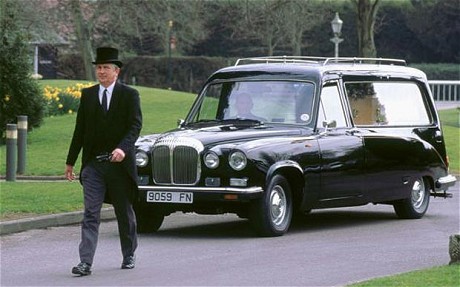Bastards. That’s what we used to call them. Next, illegitimate. We don’t call children born out of wedlock anything any more because we don’t feel we need to make a distinction.
Britain would be awash with bastards today if we still used the word because 4 out of 10 children are raised by unmarried parents. Happily the stigma of bastardy has entirely vanished. Some people get married, some don’t – whatever works for them. Some opt for a public, ceremonial plighting of troths, others for private, personal undertakings to each other. Neither the marrieds nor the cohabiters are judgemental of each other, and no one talks about living in sin any more – or shotgun weddings, remember them?
A feature of social change is that, no matter what birth pangs attend its arrival, it immediately becomes a non-event. The lead up to the gay marriage law was marked by much hullabaloo. As soon as the law passed, gay marriage become yawnsville – unremarkable. We absorb and carry on.
Direct cremation and direct burial were once reckoned astonishing and, more to the point, injurious to the emotional health of those who opted for it. It would deny them closure, leave them with all manner of unresolved grief issues. But they just keep on coming, and there is no evidence that bereavement support groups are swollen by their number.
Here at the GFG we get more and more people emailing to say thank you to us for giving them ‘permission’ not to have a ceremonial funeral after reading this: Do you really have to have a funeral?
And we meet and talk to more and more undertakers who get it — who respect direct disposal as a positive choice.
There’s been no discernible rearguard defence of the public ceremonial funeral from the conservative, traditionalist wing of the industry in Britain, and this is puzzling. You have to go to America to hear the case made:
“A good funeral involves facing the fact of death and not dispatching someone like [an undertaker] to get rid of the bad news—by removing the body from sight—but embracing the fact we have a corpse in our midst. It attends to the task of consigning this person somewhere, not in some perfunctory way but doing it with attention, ceremony, and some quest for meaning.” [Source]
Mark Higgins, the man who said that, is exactly the sort of funeral conservative you might expect him to be. What drew him to undertaking?
“I loved the pomp and circumstance, the drama, the dignity, if you will, the “black” of the event affected me. The vestments of the clergy, the black cars … We put ourselves in a posture of reverence and respect.”
It’s Thomas Lynch, together with Thomas Long, both of whom have written the best books out there on funerals, who are leading the die-hard traditionalists. Here’s Lynch:
“…. the presence of the dead so ups the existential ante that people generally feel the increased gravitas, the broadening of the emotional register, the increased sense of purpose and duty, the sense that we are somehow at swim in deeper water where the range of possible conversations and outcomes is broadened. The presence of the dead embodies, in utter stillness, the raison d’etre for the gathering, for the nervous laughter and the tears, for the wailing and belly laughs, for the entire spectrum of of responses and conversations — some holy, some hilarious, all of them focussed on the dead and the ones to whom the dead matter most.”
And he quotes Alan Ball, creator of Six Feet Under: “once you put a dead guy in the room you can talk about anything.”
Lynch and Long’s belief in the vital importance of having a dead guy in the room is unquestionably sincere. They have the best interests of the bereaved at heart. But it looks as if they are beginning to lose the argument.
This is a state of affairs for which the traditionalists cannot blame the ‘progressives’. Both camps, ironically, believe strongly in the importance of spending time in the presence of the dead. It goes without saying that this belief is in no way the product of commercial considerations.
No, direct disposal is something that has happened to undertakers and celebrants. Already it is already becoming unremarkable. It’s not for everybody, of course. But it’s the new normal. From now on, some people are going to want the dead guy in the room, others aren’t. Whatever works for them.
The impact of this on the professional status of funeral directors is likely to be profound. We’ll deal with all that in a follow-up post.



Not sure why this has to be a clash of approaches. Surely it works well for some, badly for others. The test of a good funeral director is surely to be able to help everyone with what works best/is most meaningful for them!
Again, it just comes down to choice and what ever is going to work for that family. What I find overwhelmingly frustrating is that Oxford Crematorium will do this but they won’t charge a discounted rate. Neither will Banbury Crematorium. So where so people in Oxfordshire go if they want a direct Cremation? Cost is a factor for a growing majority of people, but when faced with “You can have a direct cremation but it will be the same price,” most people would have a service to make sure they are getting their pounds worth. There is a new crematorium… Read more »
We have the same issue here, Lucy!
In a world of pro-choice, I see no reason why these type of services can’t coexist with the more traditional service.